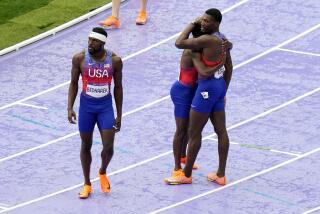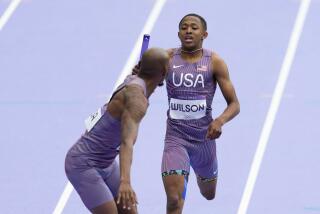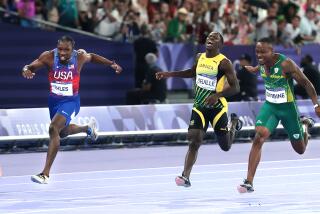U.S. Male Sprinters Are a Bit Off Track
- Share via
PARIS — U.S. male sprinters would like to declare the first three days of the track and field world championships a false start. After the embarrassment of 24 hours earlier, known in the press here as “L’Affaire Drummond,” the United States failed to win a medal in the men’s 100 on Monday for only the second time in the 20-year history of the world championships.
The evening for the U.S. sprinters started poorly when three-time champion Maurice Greene finished eighth in his semifinal heat after injuring his thigh and got worse when world-record holder Tim Montgomery and national champion Bernard Williams finished fifth and sixth in the final.
For the record:
12:00 a.m. Aug. 27, 2003 For The Record
Los Angeles Times Wednesday August 27, 2003 Home Edition Main News Part A Page 2 National Desk 1 inches; 40 words Type of Material: Correction
Track and field -- Tim Montgomery holds the world record in the 100 meters with a time of 9.78 seconds. The time was reported incorrectly as 9.87 seconds in a Sports article Tuesday about the world track and field championships.
At least Greene wasn’t alone among champions who failed to successfully defend at Stade de France.
Stacy Dragila, who won the women’s pole vault the first two times it was contested in the world championships, finally relinquished the title with a fourth-place finish. Jonathan Edwards, a two-time triple jump champion from Britain, fell to 12th. U.S. 100-meter hurdler Anjanette Kirkland, who had a baby last spring, didn’t advance beyond the second round.
But the men’s 100 provided the most startling result of the meet so far, not because Greene didn’t win it -- he hasn’t been at top form since 2001 -- but because of who did. Kim Collins, 27, of St. Kitts and Nevis, is the new champ. Even more of a surprise was runner-up Darrel Brown, 18, of Trinidad and Tobago.
Their times weren’t bad -- for 1983. Collins won in 10.07 seconds, the same time Carl Lewis ran when he won the 100 meters in the world championships two decades ago. No winner of the event had failed to break 10 seconds since until Monday.
Brown, third-place Darren Campbell of Britain and fourth-place Dwain Chambers of Britain were all timed in 10.08, with a photo at the finish line establishing their order. Montgomery ran 10.11, well off his world record of 9.87 set last September, and Williams finished in 10.13.
When the subject of the slow times was broached at a post-race news conference, Campbell, 29, replied, “I don’t know what you want us to do.”
He blamed the false-start rule that he said has literally and figuratively set the clock back in the sprints.
The previous rule allowed each sprinter one false start before disqualification. The new rule, adopted this year by the International Assn. of Athletics Federations, allows the field one false start but results in disqualification for each runner who subsequently false starts. With little margin for error, sprinters have become more tentative at the start, listening for the gun instead of anticipating it.
The rule was at the center of controversy in the second round of the 100 meters Sunday, when U.S. sprinter Jon Drummond’s demonstrative protest of his disqualification after a false-start ruling interrupted the meet for 20 minutes and delayed his heat for 47 minutes.
After IAAF spokesman Nick Davies said Sunday that officials understood Drummond’s disappointment and wouldn’t consider a punishment action until after the meet, the organization reversed itself Monday.
The IAAF, the sport’s world governing body, instructed USA Track & Field to hold a disciplinary hearing by 8 p.m. (11 a.m. PST) today concerning the behavior of Drummond and Michael Cain, a USATF official who, according to the IAAF, advised Drummond on the track Sunday not to accept his disqualification.
“If the IAAF is not satisfied with the decision of USATF, it has the right, according to IAAF rules, to impose its own sanctions,” the IAAF said.
USATF officials, spokeswoman Jill Geer said late Monday night, were reviewing the organization’s bylaws to determine whether they could hold a disciplinary hearing on such short notice.
IAAF council member Jose Maria Odriozola of Spain said Drummond should be suspended from the meet, which would prevent him from competing for the 400-meter relay team.
“There’s a small group of athletes in California who think anything goes and that they can do whatever they like,” Odriozola said.
He referred to the Los Angeles-based HSI club. Drummond, Greene and sprinter Ato Boldon are among its most prominent members.
Greene and Boldon, who also failed to advance to the 100 final, vigorously defended HSI.
“They [IAAF officials] might have an issue with Jon Drummond,” Boldon said. “But don’t make this an HSI thing.”
Meantime, a fairly interesting track and field meet was going on outside the halls of justice, particularly if, in retrospect, these championships are determined to have ushered in the new generation in the men’s 100.
Brown, at 18, is intriguing. It’s hard to tell, though, how long Collins will stay at the top.
“I’m not the most hard-working sprinter,” he admitted. “I’m more easygoing. If I don’t feel like going to practice, he [his coach] is going to get a phone call saying, ‘I’m not coming today.’ He’s got to accept that now.
“I don’t feel you should kill yourself. I don’t believe in pumping iron. I don’t lift weights. There’s a lot of things I don’t believe in.”
But just in case there has been a changing of the guard, Boldon, who, like Greene, is 29, was philosophical.
“This business is very cruel,” he said. “You don’t go out a lot of times with the beautiful parade and trumpets blowing. Sometimes you end up seventh in a semifinal with your body falling apart.”
Greene didn’t want to hear it.
“We ain’t at the end of an era yet,” he said. “I’ll be back next year.”
More to Read
Go beyond the scoreboard
Get the latest on L.A.'s teams in the daily Sports Report newsletter.
You may occasionally receive promotional content from the Los Angeles Times.






